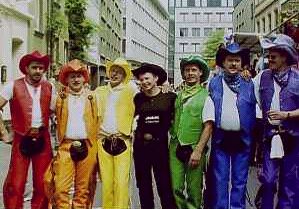 |


|
|
|
|
By Jack Nichols

Members of the Outband
No doubt country music may be one of the last American gay frontiers. It comes as an uncanny reminder to many, certainly, that there's life after Barbra Streisand. I first noticed in 1981 how in Atlanta, a new kind of gay activism was even then in process. Gay and lesbian cloggers, their noisy feet keeping time to country strains, had dared—as a troupe-- to tap their way from the safety of the inner city to outlying redneck communities, where unsuspecting audiences actually thrilled to homegrown homo talents. These brave cloggers had tippy-toed into territory that a seasoned activist like myself wouldn't have—in a million years-- targeted as a suitable locale for speech-making. But, music, and in this case, country dancing, had indeed soothed savage breasts. Atlanta's cloggers were received by hoots and hollers of joyous welcome. Country music skills, apparently, had taken these openly gay groups where no one else dared go.
An atmosphere that had once appeared menacing became merry. People who'd previously avoided eye contact, their faces dampened by dungeon scowls, changed into creatures, with the arrival of country dancing, who were obviously experiencing double delight. Macho males, once fearful of touching each other in public, grabbed their cowboy-hatted pardners' and for full evenings, the Full Moon began manufacturing its own proud brand of unfettered joy. Now, happily, the Journal of Country Music (Vol. 21, No. 1) published by the Country Music Foundation in Nashville, is giving due recognition to the talents of gay and lesbian country artists. Writer Chris Dickinson tells us that: "The last taboo in country music is about to be challenged." Revealing that there is a Lesbian & Gay Country Music Association, Dickinson explains how out gay country "artists and some of their trailblazing predecessors break the silence." He reflects on this growing movement as one "that will continue to challenge the conventional boundaries of country music."
These words—appearing in the Journal of Country Music—signal, without doubt, that our social revolution that started only a half century ago-- is reaching miraculously into the heartlands. But it comes as no surprise to me. The great loves of my life were each southerners, proud hillbillies and farm boys. I was first attracted to them because they exuded a kind of honesty, a passionate independence and directness that had seemed somehow missing in my contacts with conventionally-socialized city slickers. I remember how Lige Clarke—in 1964—took me one night to Vicco's, a huge country nightclub in Hazard, (Dukes of Hazzard territory) where the hoe-down, an awkward knee-slapping, dorky-dance was being demonstrated for us by his Kentucky kinfolk. "And they think we're queer," he laughed as we gawked. But the times, they are a changin'. At the heart of country music's lesbian and gay organization that Doug Stevens founded, writes Dickinson, beats a common belief: "that the emotional core of country music – with its evocative emphasis on loss, heartbreak, and the healing possibilities of love – belongs to anyone who finds comfort and expression in it." Out country singers and musicians have been welcomed, of course, at competitions within the 2,500 member International Gay Rodeo Association (IGRA), comprising twenty gay rodeo groups throughout the United States and Canada. These events took place last year in Washington, D.C., Phoenix, Los Angeles, and Oklahoma City. In 1993, the International Association of Gay and Lesbian Country Western Dance Clubs iaglcwdc.org was established, providing country artists with a wide variety of gay-friendly venues. It is in such locales that CDs by Doug Stevens, are likely to be heard, including his two independent CDs, Out in the Country and When Love is Right, and his forthcoming From Christopher to Castro. Living a Lie in Georgia, a song written by Stevens and former Outband guitarist Margie Fein, is described by Dickinson in the Journal as "a wounding meditation on a lesbian hitting the road out of her small hometown after her secret is revealed." Steven's web site can be accessed at www.dougstevens.net Dickinson also describes Patrick Haggerty—as "the lost pioneer of out gay country music." Haggerty founded Lavender Country in 1972, wrote lyrics and music, and—in an historic first-- released an openly gay country album in 1973.
"Country music is reality-based, and that's what it shares with folk music…It's about people's lives. There's an element of real life, real situations and real details described, which is its strength." We've come a long way since 1960, when Kitty Wells was known as the Queen of Country Music. That the Journal of Country Music has published a lengthy article chock full of such perceptive depth is a tribute to the outspoken honesty at the heart of America's rural cultures. My early fascination with hillbillies and farm folks—the simple poignancy of their music that often brought even a city slicker like me to tears—seems—in the wake of this magnificent article--to have been warranted. Before meeting Lige Clarke (Elijah), I'd dreamed of meeting a beautiful man such as he was, a child of the hills whose Pan-like presence would captivate me completely. Kitty Wells' hillbilly accents were those that then seemed to help capture the lunar essences:
Every beam brings a dream dear of you. The day is sad and dreary But the night is bright and cheery. |

© 1997-2000 BEI
 Gay country artist Doug Stevens is gaining popularity among mainstream Country and Western fans. Recently, he was featured in the Jouranl of Country Music.
Gay country artist Doug Stevens is gaining popularity among mainstream Country and Western fans. Recently, he was featured in the Jouranl of Country Music.  Alix Dobkin
Alix Dobkin